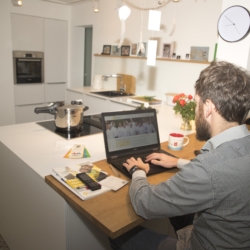To provide the best experiences, we use technologies like cookies to store and/or access device information. Consenting to these technologies will allow us to process data such as browsing behaviour or unique IDs on this site. Not consenting or withdrawing consent, may adversely affect certain features and functions.
The technical storage or access is strictly necessary for the legitimate purpose of enabling the use of a specific service explicitly requested by the subscriber or user, or for the sole purpose of carrying out the transmission of a communication over an electronic communications network.
The technical storage or access is necessary for the legitimate purpose of storing preferences that are not requested by the subscriber or user.
The technical storage or access that is used exclusively for statistical purposes.
The technical storage or access that is used exclusively for anonymous statistical purposes. Without a subpoena, voluntary compliance on the part of your Internet Service Provider, or additional records from a third party, information stored or retrieved for this purpose alone cannot usually be used to identify you.
The technical storage or access is required to create user profiles to send advertising, or to track the user on a website or across several websites for similar marketing purposes.
 Older workers might choose to delay their retirement if offered the option of continuing to do their jobs working from home after the pandemic, according to new research from the UK’s Office for National Statistics. The ONS study found those in their 50s and 60s who worked from home during the coronavirus crisis said they were planning to retire later than those who were still travelling to their workplace. More →
Older workers might choose to delay their retirement if offered the option of continuing to do their jobs working from home after the pandemic, according to new research from the UK’s Office for National Statistics. The ONS study found those in their 50s and 60s who worked from home during the coronavirus crisis said they were planning to retire later than those who were still travelling to their workplace. More →





 ‘Hybrid’ is the ideal working environment among Brits today, but twice as many workers would like to be 100 percent office-based than work permanently from home, according to the latest research from
‘Hybrid’ is the ideal working environment among Brits today, but twice as many workers would like to be 100 percent office-based than work permanently from home, according to the latest research from 
 Nearly half (42 percent) of employees think the working culture of their organisation has deteriorated during the pandemic. That’s according to research by
Nearly half (42 percent) of employees think the working culture of their organisation has deteriorated during the pandemic. That’s according to research by 


 New research from
New research from 
 While we remain eager to safely leave coronavirus restrictions behind us and return to normal, there are several changes brought about by the pandemic which UK employees hope will stick around. The most important one being hybrid working, according to new research from
While we remain eager to safely leave coronavirus restrictions behind us and return to normal, there are several changes brought about by the pandemic which UK employees hope will stick around. The most important one being hybrid working, according to new research from 
 When considering a hybrid working method for your organisation, it’s far too easy to try think of what will work for all employees as a whole, rather than breaking this down and thinking about the different needs from certain groups of people. One example of this is age and experience. Employees from different age groups and at different levels of experience within in an organisation may have very different needs when it comes to hybrid working. Those who have been with the business, or in a similar work environment, for some time may be perfectly comfortable to work from home the majority of the week, with little help or supervision. However, this probably isn’t going to work as well for younger employees with less experience.
When considering a hybrid working method for your organisation, it’s far too easy to try think of what will work for all employees as a whole, rather than breaking this down and thinking about the different needs from certain groups of people. One example of this is age and experience. Employees from different age groups and at different levels of experience within in an organisation may have very different needs when it comes to hybrid working. Those who have been with the business, or in a similar work environment, for some time may be perfectly comfortable to work from home the majority of the week, with little help or supervision. However, this probably isn’t going to work as well for younger employees with less experience. 
 The COVID-19 pandemic has accelerated the transition away from traditional workforce models, and 56 percent of companies are expecting to shift more of their roles to contingent, project or contract work as a result, according to a new report by
The COVID-19 pandemic has accelerated the transition away from traditional workforce models, and 56 percent of companies are expecting to shift more of their roles to contingent, project or contract work as a result, according to a new report by 
 Long working hours led to 745,000 deaths from stroke and ischemic heart disease in 2016, a 29 per cent increase since 2000, according to the latest estimates by the World Health Organization and the International Labour Organization published in
Long working hours led to 745,000 deaths from stroke and ischemic heart disease in 2016, a 29 per cent increase since 2000, according to the latest estimates by the World Health Organization and the International Labour Organization published in 
 The Pensions Regulator might now have the power under current UK pensions legislation, to enter the private homes of employees when it is investigating their employer, if those employees are working from home. The current law has been in force since 2005 and it allows the
The Pensions Regulator might now have the power under current UK pensions legislation, to enter the private homes of employees when it is investigating their employer, if those employees are working from home. The current law has been in force since 2005 and it allows the 
 New research by
New research by 









August 26, 2021
Working from home: how far we’ve come and where we might be headed
by Georgina Smith • Comment, Flexible working, Workplace design